

NOTE: quite a few video’s today, which don’t always show if you receive this by mail. In that case, please refer to the Automatic Earth site.

“I’ve seen atrocities in war areas that were physically more horrible but I’ve never seen a single person pursued so relentlessly and with so little foundation.”
• Relentless and Unrestrained Public Mobbing, Intimidation and Defamation (CN)
“It was obvious that Mr. Assange’s health has been seriously affected by the extremely hostile and arbitrary environment he has been exposed to for many years. Most importantly, in addition to physical ailments, Mr. Assange showed all symptoms typical for prolonged exposure to psychological torture, including extreme stress, chronic anxiety and intense psychological trauma.” “My most urgent concern is that, in the United States, Mr. Assange would be exposed to a real risk of serious violations of his human rights, including his freedom of expression, his right to a fair trial and the prohibition of torture and other cruel, inhuman or degrading treatment or punishment,” said Melzer.
He said he was “particularly alarmed” by the Espionage Act charges. “This may well result in a life sentence without parole, or possibly even the death penalty, if further charges were to be added in the future,” said Melzer. “[Assange] is really something I’ve never seen in 20 years,” Melzer said. “I’ve seen atrocities in war areas that were physically more horrible but I’ve never seen a single person pursued so relentlessly and with so little foundation. “[When I saw him] I immediately compared him to some of the graver cases in interrogation prisons in terms of his psychological reaction patterns. That’s what alarmed me so much.” He said Assange’s treatment was “very close to the intentional, purposeful infliction of coercive measures to try to break him”.
He appeared “extremely agitated and preoccupied,” Melzer said. “He asked a lot of questions and he would jump around, he was so preoccupied with everything he can’t even compute my answers any more. “There were episodes of this, then he was part of the conversation as normal, then again he would enter into this agitated state. I have seen with other victims of psychological torture that would happen.” Melzer also blasted the government of Assange’s native Australia. He told the newspaper, “Australia is a glaring absence in this case. They’re just not around, as if Assange was not an Australian citizen. That is not the correct way of dealing with that.”

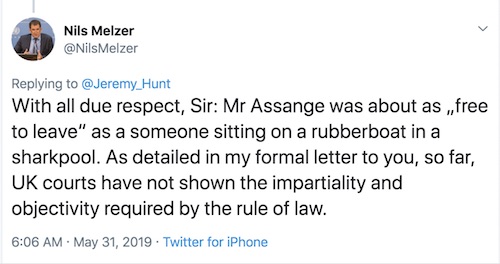

Interesting man for sure. This part of his report stands out:
“I believe we have to take a step back and look at all these proceedings, how they have been conducted, and come to our own conclusions whether these are fair. We also have to take a step back and look at this whole narrative of suspected rapist; narcissist; selfish, ungrateful person; hacker, and scratch the surface a little bit and see what’s below there.
When I was first approached by his defense team seeking protection from my mandate in December last year, I was reluctant to do so, because, me, too, I had been affected by this prejudice that I had absorbed through all these public, you know, narratives spread in the media over the years. And only when I scratched the surface a little bit, I saw how little foundation there was to back this up and how much fabrication and manipulation there is in this case. So I encourage everybody to really look below the surface in this case.”
• UN Special Rapporteur Calls for Julian Assange to Be Freed (DN)
The United Nations special rapporteur on torture is warning that WikiLeaks founder Julian Assange is suffering from the effects of “psychological torture” due to his ongoing detention and threats of possible extradition to the United States. The U.N. expert, Nils Melzer, also warned that Assange would likely face a “politicized show trial” if he were to be extradited to the United States. Melzer writes, “In 20 years of work with victims of war, violence and political persecution, I have never seen a group of democratic states ganging up to deliberately isolate, demonize and abuse a single individual for such a long time.” Julian Assange is currently serving a 50-week sentence for skipping bail in 2012 at London’s Belmarsh Prison, after he was forcibly removed from the Ecuadorean Embassy by British police last month.
Last week, the U.S. Justice Department announced it was charging Assange with 17 counts of violating the Espionage Act for his role in publishing U.S. classified military and diplomatic documents exposing U.S. war crimes in Iraq and Afghanistan. Assange, who had already been charged on one count of hacking a government computer, now faces up to 170 additional years in prison under the new charges—10 years for each count of violating the Espionage Act. Assange was due to appear by video link before a magistrates’ court on Thursday but failed to appear, reportedly due to health problems. We speak with U.N. Special Rapporteur on Torture Nils Melzer.

Nils Melzer did a whole range of interviews in one day.
• Assange ‘Psychologically Tortured To Breaking Point By Democratic States’ (RT)
Jailed WikiLeaks co-founder Julian Assange shows clear signs of degrading and inhumane treatment which only adds to his deteriorating health, UN Special Rapporteur on Torture Nils Melzer told RT. Assange has “all the symptoms typical for a person who has been exposed to prolonged psychological torture,” Melzer told RT’s Afshin Rattansi. This adds to the toll of his deteriorating physical state caused by a lack of adequate medical care for several years, he said. Melzer said he was judging from two decades of experience in working with POWs and political prisoners, and only after applying “scientific” UN methods to assess Assange’s condition. But the journalist’s case still “shocked” him.
An individual has been isolated and singled out by several democratic states, and persecuted systematically… to the point of breaking him. Earlier this month, a UK court sentenced the WikiLeaks co-founder to nearly a year in jail for skipping bail in 2012. The courts are now deciding whether to extradite Assange to the US where he is wanted for 17 charges under the Espionage Act. He can end up serving up to 175 years in prison if proven guilty.

Me too, I thought of Warmbier: “..how would we look a lot different to the North Koreans on the surface?’
• Are US/UK Trying To Kill Assange? – Ron Paul (DM)
Former Congressman and presidential candidate Ron Paul says Julian Assange could die in prison and blames the apparent deterioration in the WikiLeaks founder’s heath on how he is being treated by the US and UK governments. Speaking on ‘Ron Paul Liberty Report, the 83-year-old accuses the US government of pursuing Assange and says they would like to either challenge him with a death penalty or a life time in prison ‘for being a journalist.’ The Libertarian calls Assange’s a ‘tragic story’ and describes his health as ‘very very bad,’ commenting that friends of the whistleblower are worried that his health may not hold up. [..] Paul also compares Assange’s plight to the case of Otto Frederick Warmbier, an American college student imprisoned in North Korea in 2016.
In June 2017, Warmbier was released by North Korea in a vegetative state and died soon afterward. Paul goes on to ask what the ramifications would be if Assange is much sicker than is being revealed and dies in prison as the result of how his case has been handled by Washington and London. ‘If he had a terminal disease or something happens to him, good, bad, or whatever and he dies in the prison, how would we look a lot different to the North Koreans on the surface?’ Paul questions. Paul goes on to slam the American media and journalists for their lack of reporting on Assange’s health problems, adding that news of his ill health came out via a Swedish newspaper. Paul adds there is ‘not much good journalism around any more’ and that by not doing more reporting on Assange, journalists ‘don’t want to protect their right to be a journalist.’

They still wouldn’t realize a thing.
• Assange May Have To Die Before Journalists Realize Implications – Galloway (RT)
“Julian Assange may have to die in the hospital wing of Belmarsh prison in order to bring it about” George Galloway believes it’s not long until ‘we could be in George Orwell’s 1984’ as he talks to In Question’s Manila Chan about the Wikileaks founder being too ill to appear at extradition hearing.

The US will end up all alone.
• 36 Countries The US Has Bullied This Week (RT)

© Global Look Press / Uwe Skrzypczak
It’s been a busy few days for American diplomacy, with three dozen nations ending up at the receiving end of threats, ultimatums and sanctions this week alone. And it’s only Friday. Mexico is the latest target, slapped with 5 percent tariffs on each and every export, gradually increasing to 25 percent until it stops the flow of Latin American migrants into the US, thus fulfilling one of President Donald Trump’s election promises. Most of those migrants aren’t even from Mexico. On the other side of the world, India is reportedly about to be forced to face a choice: ditch the purchase of Russian S-400 air defense systems or face sanctions under the Countering America’s Adversaries Through Sanctions Act (CAATSA, Washington’s go-to cooperation enforcement instrument).
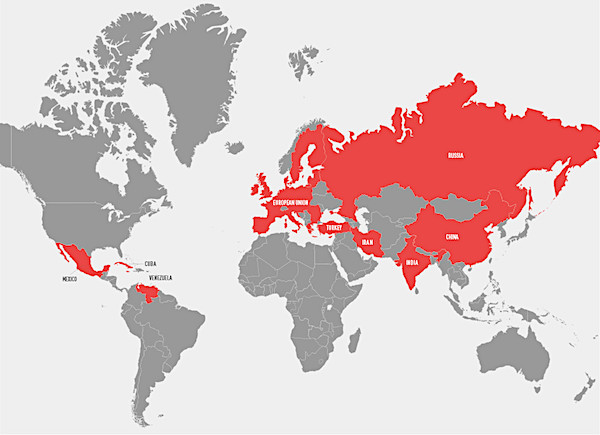
Turkey is facing a similar ultimatum: abandon S-400s (something Ankara has repeatedly refused to do) or lose access to the F-35 fighter jet program. This threat was repeated on Thursday by Kathryn Wheelbarger, US acting assistant secretary of defense for international security affairs. Ankara has already invested some $1.25 billion into the super-expensive American fighter, but with a lot of its parts being made in Turkey, it’s still an open question who would be the bigger loser. The entire European Union could be facing punishment if it tries to trade with Iran using its non-dollar humanitarian mechanism to bypass the American embargo. Having worked hard on the 2015 nuclear deal with Tehran, which has repeatedly been confirmed to be working, EU member states are not ready to ditch trade at Trump’s whim – and US Special Representative to Iran Brian Hook on Thursday reaffirmed the threat of CAATSA sanctions.

”The object is solely to divert the nation’s attention with an impeachment circus, allowing Mr. Mueller to slip away harmlessly into history..”
• Prelude to a Fiasco (Jim Kunstler)
You’d think that Robert Mueller might know what any licensed attorney-at-law in the land tells a client in a tight spot with a lame alibi: better keep you mouth shut. Instead, Mr. Mueller crept Sphinx-like out of the Deep State woodwork on little cat’s paws and in a brief nine minutes blabbed out a set of whopperish riddles much more likely to get himself in trouble than the target of his hinky inquisition. The key whopper was that he could not make “a determination” on an obstruction-of-justice charge against Mr. Trump because guidance policy from the DOJ’s Office of Legal Counsel had said some years ago that a sitting president can’t be indicted. That is not what he told his boss, Mr. Barr, the Attorney General (and a roomful of the AG’s staffers who heard it), in person when he delivered his final report a few weeks ago.
Upon receipt of that report, Mr. Barr asked the Special Counsel three times whether his inability to conclude anything on an obstruction charge was due to the OLC guidance, and three times Mr. Mueller answered “no.” Mr. Barr relayed this on-the-record in testimony before the House Judiciary Committee and, as averred above, he has plenty of witnesses. It should not be hard to reach a determination on who is telling truth here. In fact, Mr. Mueller could have declared that he found chargeable obstruction crimes were committed based on the evidence, and also demurred to press them at this time — leaving them available to federal prosecutors until after the president was out of office, one way or another.
The reason he didn’t is that Mr. Mueller does not want the case to come to trial, ever, because he would lose badly and his reputation would be destroyed. Consider that in any trial, the defendant gets to call witnesses and make his own case. The evidence for gross prosecutorial misconduct on the part of Mr. Mueller and his associates is mountainous compared to the molehill of Mr. Trump’s temper tantrums over the seditious hoax he was subject to. And that matter is now moving in the direction of adjudication. So instead, Mr. Mueller has set in motion a potential political crisis as momentous as the Civil War, but completely unlike it.
Knowing that congress can impeach the president on just about anything — especially this president, publicly reviled like no other before him — he served congress the platter of material to use in the form of his final report, and pretty much dared them to not go forward with it. Get this: it is a ruse. The object is solely to divert the nation’s attention with an impeachment circus, allowing Mr. Mueller to slip away harmlessly into history without sacrificing his own reputation in a courtroom.
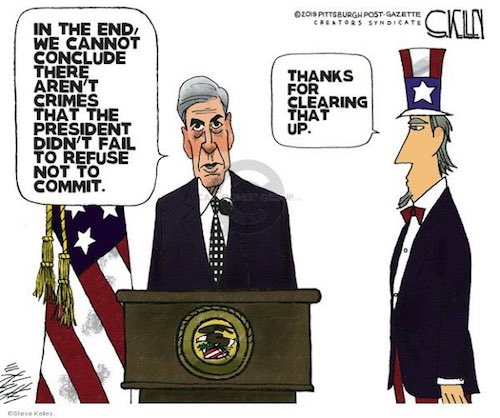

We like big numbers.
• US Stock Market Forgoes $5 Trillion In Returns Due To Trade War – Deutsche (MW)
The U.S. stock market has left $5 trillion on the table as trade tensions over the past 17 months contributed to an effectively sideways trade, Deutsche Bank estimated on Friday. “While other factors also arguably played a role, the trade war has been key in preventing a recovery in global growth and keeping U.S. equities range bound. Foregone U.S. equity returns from price appreciation for 17 months are worth $5 trillion,” wrote Binky Chadha, the bank’s chief strategist, in a Friday note, based on an price appreciation at an annual rate 12.5% (see chart below).
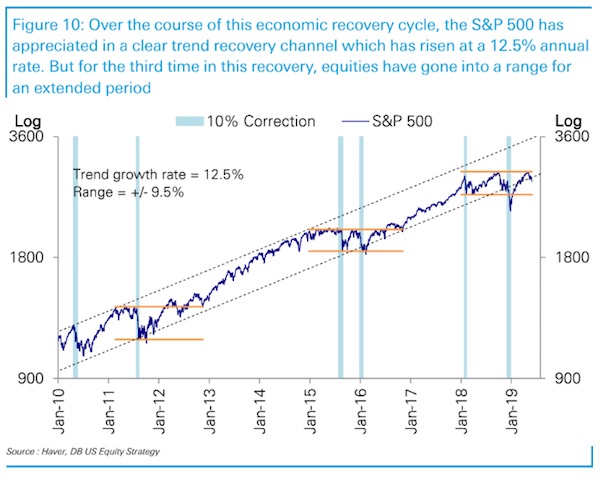
Chadha’s calculation is based on the capitalization of the Russell 3000, a broad measure of equity markets, which had a capitalization of $28.7 trillion at the start of 2018. Foregone returns for the index over 17 months comes out to $5 trillion. The S&P 500 in the first four months of 2019 bounced back sharply from a steep fourth-quarter selloff nudging to an all-time closing high in April. But the index has retreated more than 6% in May, posting its first monthly decline since December and its worst May performance since 2010. The Dow Jones Industrial Average which failed to return to record territory before the May swoon, also fell more than 6% for the month.

What $20 trillion in stimulus bought you.
Stocks were already gunning for the worst May since 2010 when, on the evening before the last trading day, Trump tweeted that he would impose tariffs on imports from Mexico, if Mexico doesn’t crack down on migration flows coming through its southern border. Those tariffs would hit the automakers particularly hard because they imported 2.6 million vehicles from Mexico in 2018, up 10% from the prior year. Not even counting the component makers. But the Presidential tweet was just the icing on the cake. May had been crappy for stocks before the tweet went out.
The S&P 500 index, which earlier this week had fallen through 2,800, dropped another 1.3% today to 2,752, down 6.8% from its peak in early May that had exceeded by a hair the prior peak of September 2018. The index is now back where it had first been on January 9, 2018, having spent nearly 17 months going nowhere, despite intoxicating surges and nerve-wracking drops. And the chart is morphing from “not pretty” to something a little uglier (data via S&P Dow Jones Indices):
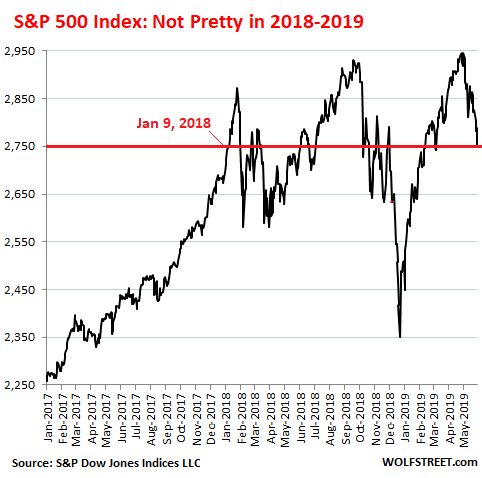
The Dow Jones Industrial Average fell 1.1% today, unceremoniously plopping through the 25,000 level and closed at 24,815. It’s now 7.9% below its October 2018 peak and right back where it had first been in December 2017, having spent 17 months gyrating to nowhere, including a 19% peak-to-trough plunge in four months followed by a blistering 22% rally in four months. The Nasdaq composite dropped 1.5% today, to 7,453, the level it first reached in January 2018, also going nowhere in nearly 17 months despite a huge bout of volatility. It fell 8.7% in May. The Russell 2000 index, which covers stocks with smaller market capitalization, fell 1.3% today, to 1,478. It’s down 9.2% in May alone, down 15.7% from its October 2018 peak, and right back where it had first been on September 26, 2017, a very volatile 20 months of going nowhere. Chart looking ugly (data via Investing.com):
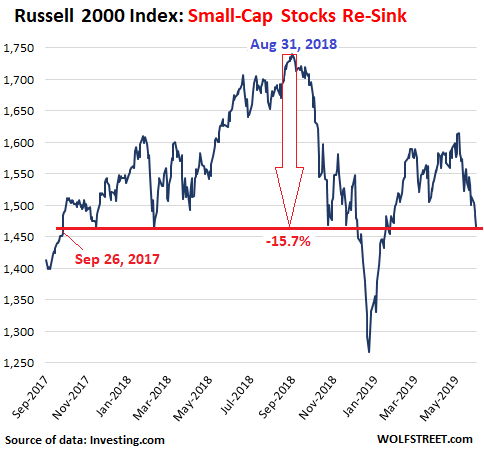

This just might go horribly wrong.
• Mexico Tariffs May Hurt $600 Billion In Cross-Border Trade, US Economy (MW)
The U.S. economy could suffer a wrenching blow, business leaders and economists say, if President Trump follows through on his threat to slap tariffs on all imports from Mexico in a dispute over immigration controls. The president on Thursday said he would apply a 5% tariff on $350 billion in imports from Mexico unless the country reduces the flow of immigrants seeking to enter the United States. The surprise move slammed the stock market and prompted an immediate backlash from business. “These proposed tariffs would have devastating consequences,” said Jay Timmons, president of the National Association of Manufacturers. “Workers should not be forced to suffer because of the failure to fix our immigration system.”
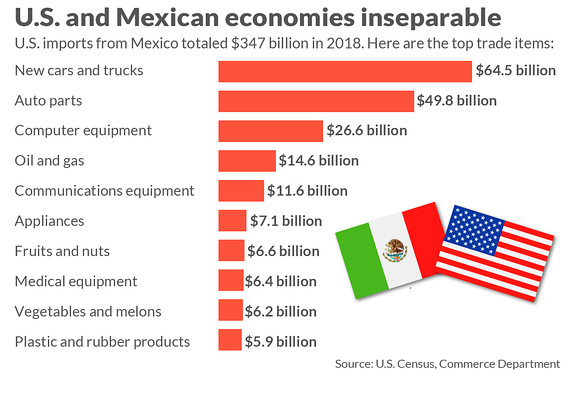
Households could face higher prices for groceries and other key consumer staples, economists say. And businesses would have to pay more for key parts and materials, especially in the auto industry. “The duties represent a significant risk to business activity both north and south of the border,” said chief economist Gregory Daco of Oxford Economics. He said Mexico could be thrown into recession while U.S. growth could fall to 1% or less by 2020. The economies of the U.S. and Mexico have become inextricably intertwined in the quarter of a century since the North American Free Trade Agreement deal was signed in 1994. The two countries exchanged a whopping $612 billion in goods last year, making Mexico the third largest trading partner after Canada and China. More than $1.5 billion in products cross the border between the two countries every day.
Although Mexico is popularly known as the main U.S. source for avocados and tequila, the huge amount of products it sends to its northern neighbor each year touch almost every major segment of America’s economy. The U.S. imports enormous quantities of autos and parts, computer equipment, oil and gas, appliances and plastic and rubber products — not to mention fruits and vegetables such as tomatoes, berries and melons. Mexican imports in 2018 hit a record $347 billion.
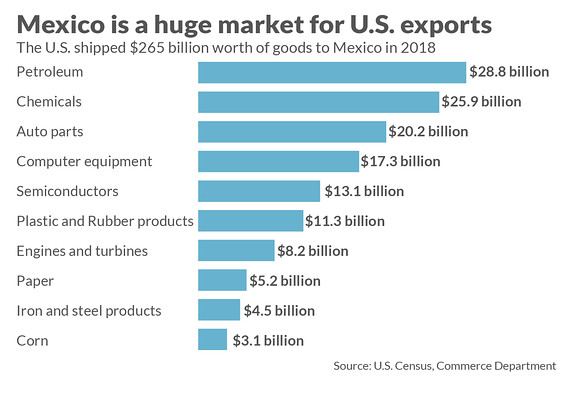

Geez, is that still on?
• Brazil Snubs Venezuelan Opposition Envoy As Doubts Rise On Guaido (R.)
Brazil withdrew an invitation to the envoy for Venezuelan opposition leader Juan Guaido to present her diplomatic credentials, she said on Friday, and the government in Brasilia said it would decide later whether to accept them. Brazilian President Jair Bolsonaro still recognises Guaido as the legitimate president of Venezuela, his spokesman said. Guaido’s envoy, Maria Teresa Belandria, played down the idea that the snub reflected scepticism from Bolsonaro’s government. Diplomatic analysts said mounting evidence that a change of government in Venezuela is not imminent may have Bolsonaro and his aides wondering if they overplayed their support for Guaido.
Former military officers making up about a third of Brazil’s cabinet have been wary of provoking Venezuelan President Nicolas Maduro, warning against moves that could tip an economic and political crisis into violence across Brazil’s northern border. Belandria had been invited to present her credentials at the presidential palace along with ambassadors from other countries next Tuesday, but the government changed its mind. “I was uninvited,” she told Reuters, but went on to dismiss any suggestion the snub reflected diminished support for Guaido. “There will be another opportunity,” she said. “Brazil’s support continues to be strong, solid and decisive. It’s merely a protocol matter.”

Julian on Google









